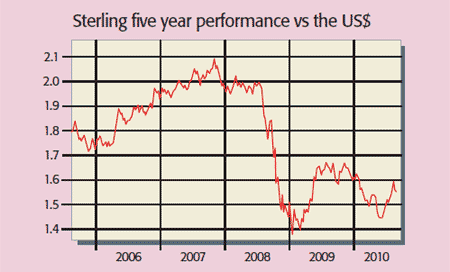
Only a few weeks ago the pound was still on the ropes. According to US derivatives regulator the CFTC, bets were nine to one against the pound. Markets speculated that with a ballooning budget deficit Britain could even lose its top triple-A credit rating. Then, in the wake of George Osborne’s maiden budget, sterling rallied against the dollar from a low of 1.43 to a peak of 1.59 since June. It’s also enjoyed a mini-bounce against the beleaguered euro. Enjoy it while it lasts.
As Ian Stannard of BNP Paribas puts it, “Sterling is extremely vulnerable and is likely to start moving lower. The market has been far too optimistic on its forecasts for the UK generally. These forecasts will have to be downgraded. We’re probably at the peak of activity in the UK economy.” And he is hardly the only pound bear. Of the 33 economists forecasts surveyed by Bloomberg, 29 of them anticipate the pound will fall in the next year. Stannard’s team believe it could fall as low as 1.32 against the dollar, a 14% decline.
The headwinds are building fast. Consumer finances have taken a turn for the worse, according to Markit and YouGov. The poll, issued to 2,000 households, shows consumer optimism at 37.9, with any level below 50 representing deterioration. Business confidence isn’t any better. The index of business confidence fell four points in the third quarter to 21.5, Grant Thornton and the Institute of Chartered Accountancy in England and Wales said, citing a survey of 1,000 members.
The OECD, a rich country think tank, said its lead indicator for Britain has fallen in the past three months. The country’s output gap has not been closed and spare capacity remains. And a survey from the Royal Institution of Chartered Surveyors survey shows 8% more estate agents are reporting a fall in house prices than the combined total of those reporting stable or rising prices. It’s the first decline for the first time in a year. Mortgage approvals were down again in July.
Little wonder many suspect further quantitative easing is on the way. This week Bank of England monetary policy committee member Martin Weale has said that Britain faces a “real risk” of a second recession. That prospect and further central bank measures to counter another slump will see off sterling’s recent rally.